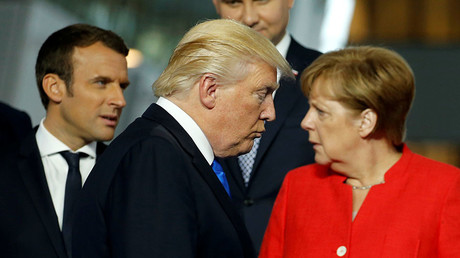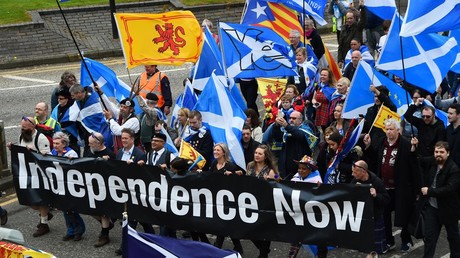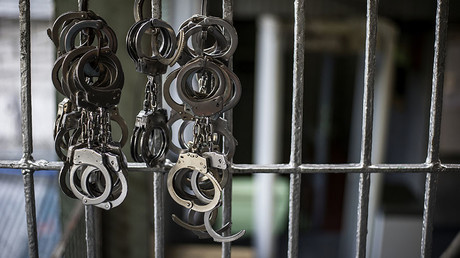The dancing bear of British hypocrisy over Russia
John Wight has written for newspapers and websites across the world, including the Independent, Morning Star, Huffington Post, Counterpunch, London Progressive Journal, and Foreign Policy Journal. He is also a regular commentator on RT and BBC Radio. John is currently working on a book exploring the role of the West in the Arab Spring. You can follow him on Twitter @JohnWight1

It is time to confront the fact that the British political class is the most toxic and mendacious of any in the West, up to and including the US.
It is also time to recognize the fact that Brexit is nothing more than a diversion – that in truth, whether in or out of the EU, Britain will continue to play an onerous role in the world, a key pillar of a Washington free market consensus that has sown an ocean of misery at home and abroad, and an eager champion of regime change wars that have taken a scalpel to international law and wrought unremitting devastation and destabilization.
Thus, whenever the British political establishment and its loyal media attempt to assert the moral high ground over the behavior and actions of other countries, it can only ever be a surreal spectacle – to all intents like watching a dancing bear.
The latest example of the congenital hypocrisy that passes for principle on the part of the British political class comes with a storythat has appeared in the UK Guardian newspaper. It reveals that the "UK will use a series of international summits this year to call for a comprehensive strategy to combat Russian disinformation and urge a rethink over traditional diplomatic dialogue with Moscow, following the Kremlin's aggressive campaign of denials over the use of chemical weapons in the UK and Syria."
The deployment of the word 'denial' in the aforementioned passage is especially interesting. It reminds us that when it comes to both the poisoning of Sergei Skripal and his daughter Yulia in Salisbury, England, and the alleged chemical weapons attack in Douma by Syrian government forces, the British government and media's denial of the need to provide a shred of solid evidence when it comes to ascribing responsibility and guilt has been shameless, with the resulting rush to judgment without evidence in both cases has been nothing short of scandalous.
And yet the British political class and its loyal media have the temerity to wonder why an ocean of skepticism exists within the country when it comes to their narrative? Just what do they expect after Iraq and Libya – countries upon which hell was unleashed in the cause, not of security, democracy or human rights, as claimed, but instead in the cause of imperialism, red in tooth and claw?
"One who deceives will always find those who allow themselves to be deceived," Machiavelli writes, and with the British public less willing to be deceived by their government and media on matters of war and peace today as it was yesterday, a crisis of confidence in the status quo has ensued.
It is a crisis reflected in the rise in support for Scottish independence in recent years, a Brexit referendum result that has pitched the country into prolonged and ongoing political dislocation, and the emergence of the hitherto obscure and anonymous antiwar and socialist backbench MP, Jeremy Corbyn, as leader of the same Labour Party over which Tony Blair once reigned as an avowed neoliberal champion of regime change wars.
Over and above the Skripal case, the Guardian story lays out the obligatory indictment sheet of Russia's supposed 'crimes': Litvinenko, Ukraine, Syria, cyber-warfare et al. The first and last of those has not been proven beyond reasonable doubt, though as we have explored, the trifling matter of proof is an optional extra where the British political establishment's embrace of Russophobia is concerned.
When it comes to Ukraine, must we go over this ground again? Is it really necessary to remind people of the perfidious role of Western governments and politicians in supporting the vicious and violent overthrow of a democratically elected government in 2014 – in process of which the cause of fascism and ultra-nationalism has been allowed to flourish in western Ukraine as never before since the Nazi occupation during the Second World War?
Moreover, not only did this Western-backed coup in Kiev trample over the democratic rights of millions of ethnic Russians and Russian speakers in eastern Ukraine and Crimea, it posed a threat to their physical safety, such was the seething anti-Russian sentiment driving it.
As for Syria, the simple and ineluctable truth is that Russian military forces have since 2015 been operating in the country in full accordance with international law on the side of the country's legitimate government, combatting a terrorist menace which grew out of the seeds of chaos and carnage planted by the UK and its Washington ally in Iraq back in 2003. The war they unleashed on that country on the basis of fabricated claims of WMD only succeeded in sparking a sectarian civil war and bloodbath, the consequences of which the Iraqi people are still suffering to this day.
In most people's language, Iraq was a crime and those responsible war criminals, yet neither former British Prime Minister Tony Blair nor any UK government official or minister party to the decision to embark on the war has been held to account. But no matter, we are expected to believe that Russia is the rogue state.
Still today, despite Iraq, a brazen lack of respect for international law and the UN Charter underpins UK foreign policy, what with British military forces operating in Syria illegally without either the sanction or permission of the government in Damascus.
Moving on, the degeneration of the British political establishment is mirrored in the degeneration of the country's media. Rather than a Fourth Estate functioning as a check on the untrammelled power of the government and undue political influence of the rich, the UK mainstream media and press is but a sword in their hands, wielded against the poor and the powerless, against dissenting voices at home and recalcitrant countries abroad.
In the case of the Guardian newspaper, this degeneration has been particularly acute. Once a trusted source of investigative journalism and a platform for such eminent dissenting voices as award-winning journalist John Pilger, today it pumps out establishment nostrums with liberal (in both the political and descriptive sense) gusto.
Former Guardian journalist Jonathan Cooke identifies the problem thus: "It is not accidental that the Guardian's journalists are almost all Oxbridge graduates, that they are almost all white and middle or upper class, and that the great majority come from London and the home counties. They were selected that way precisely so they would not reflect other class interests – interests that might challenge the very ideological assumptions the Guardian depends on and upholds."
The depiction of Russia by the British political and media establishment as the fount of all evil in the world, as the source of the mounting crises engulfing the West – measured at home in ever-deepening social disintegration on the back of unprecedented inequality, and measured abroad in a catalogue of foreign policy disasters, leading to refugee crises, destabilization and the spread of terrorism – conforms to the actions of a political order bereft of legitimacy, moral or otherwise.
Thus the time has come not for the strengthening of an anti-Russian alliance, but for the establishment of an anti-West alliance.
The statements, views and opinions expressed in this column are solely those of the author and do not necessarily represent those of RT.




0 Comments:
Post a Comment
Subscribe to Post Comments [Atom]
<< Home